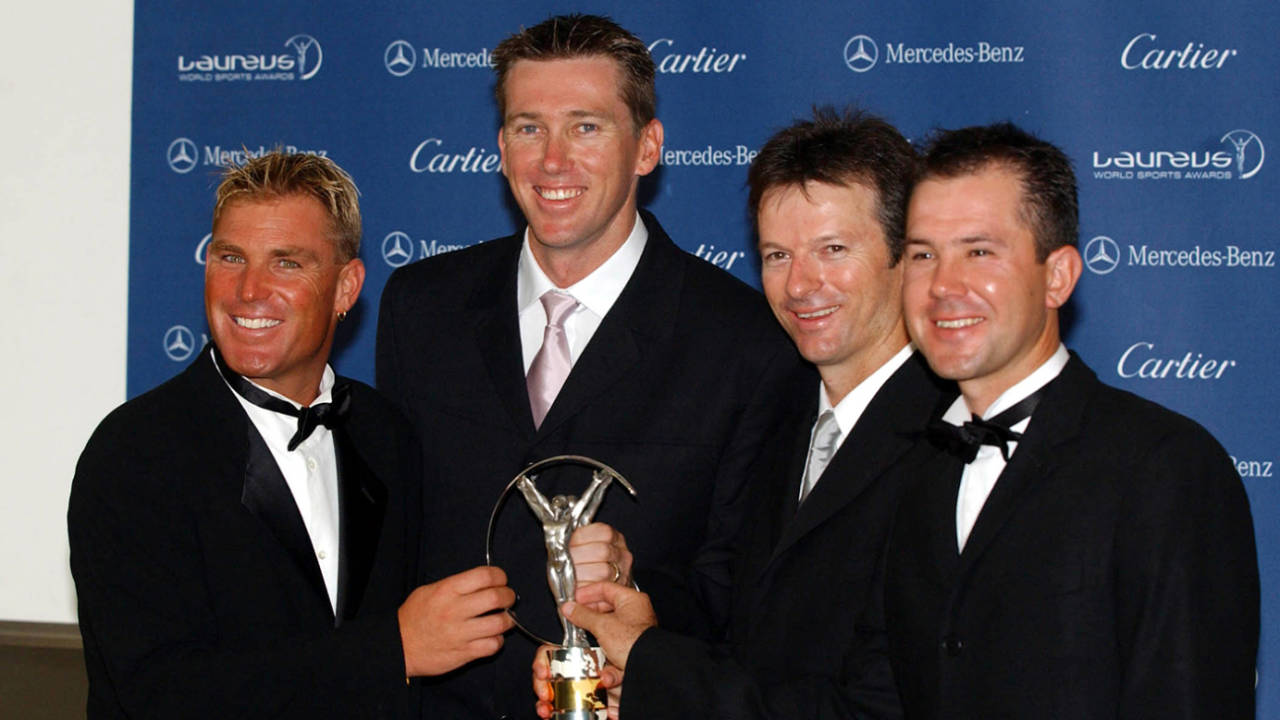For cricket fans like me who grew into their teens during the late 1990s or early 2000s, the Australian teams of the time were to be admired or hated, occasionally to be loved, but never to be ignored. So effervescent was the Australian brand of cricket then that many of us wanted our own national teams to play like them. It must be remembered though that the brand was established, lifted and sustained by once-in-a-generation players, whose performances merited greater consideration than their mutterings.
If
Glenn McGrath was the infallible metronome who excelled almost every day,
Shane Warne was the magician who invariably delivered on the big stage.
Steve Waugh might have been easygoing outside a cricket ground but on it became synonymous with grit, giving it, as Rahul Dravid wrote, a good name. Big
Matt Hayden was around too, and whenever he strolled down the pitch to the most fiery of quicks, which was often, he gave us the strongest affirmation of Australian fearlessness. Then there was
Ricky Ponting - brash, with that crooked smile writ across his small face, but indefatigable on many a long day, the blade of his bat blurring in the slipstream of its own speed, as yet another disdainful pull stroke fetched him a four or a six.
There were other fine players, too, in the Australian teams I grew up watching. A good number of them, as well as the illustrious messieurs mentioned earlier, sledged more often than not, frequently got on the nerves of their opponents and match referees, and tested the anyway ill-defined boundaries of the spirit of cricket (though
Adam Gilchrist often walked), but remained relevant because their verbal excesses and physical posturing were often just side notes - if grating ones at that - in a drama where their performances regularly contributed to memorable Australian wins.
It is therefore amusing to hear someone like
Michael Clarke, who started and played the early part of his international cricket in great Australian teams, say that
Australia will not win much with their new commitment to a more gentlemanly code of on-field behaviour.
I am no Australian, but it has always appeared to me that the Aussie brand of cricket has had less to do with bravado and more to do with fighting hard for every little inch in a tight contest, echoing the words of Al Pacino's character from Any Given Sunday. In this connection, Australian cricket was indeed fortunate that it had for a while, in McGrath's frugality, Warne's sorcery, Waugh's cussedness, Hayden's forthright blade and Ponting's street-fighting belligerence, the perfect set of instruments, scarcely paralleled in excellence in the history of the game, dedicated to the singular end of winning every inch. And when those instruments performed in unison, how many inches did they win, how many matches, against how many teams and in how many places!
It has been a while since that glorious era of Australian cricket passed, however, like the golden era of West Indies cricket long before that. They may therefore not win at cricket as often as they used to, and not as comprehensively as they did anyway, but if opponents still give Australian teams great respect, it is because they never give up. The resilience that the cricketers here display may be attributed to the Australian way of life, the way kids are taught to play sport, the quality of domestic cricket in the country, or a raft of other things Australian about which I haven't a clue. Its vitality, though, if I dare say, is independent of any opinions that anyone might hold about what constitutes proper "Aussie aggression" on a cricket field.
If a confrontational style of play and verbal loudness were at the heart of Australian achievement in cricket, as some seem to suggest, then the current teams, led by
Aaron Finch and
Tim Paine would, overnight, go from being proud but adequate performers to world-beating dragons - the sort who responded to the
2005 Ashes defeat with as sonorous a retribution as any seen (or heard) in the annals of the game. That implication seems equal parts wishful thinking and day dream.
There is little doubt that a potent Australian team across formats is extremely important to world cricket. To build one again, though, the stakeholders of Australian cricket will find energies and resources better employed in trying to find (or nurture) the next good legspinner, the next gritty middle-order batsman or the next wicketkeeping allrounder, rather than fanning the flames of misplaced aggression that has sent Australian cricket on an important journey of introspection.
A phonologist and English teacher, Srinivas S lives and works in Chennai, and in his down time likes to watch, talk, write and read about cricket
